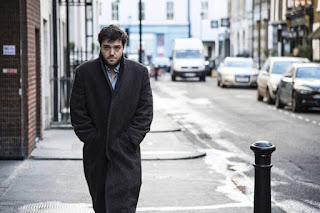This article was originally published in The Courier on 30 September 2017.
THE CHILD IN TIME: Sunday, BBC One
BAD MOVE: Wednesday, STV
It’s
every parent’s nightmare. You’re in a busy public area with your young child.
You turn your back on them for just a moment, but when you return they’ve
vanished, never to be seen again.
That
harrowing, plausible scenario was, of course, the spur for series one of The Missing, in which James Nesbitt
played an obsessive father desperately searching for his abducted child. It’s
also the premise of the relentlessly depressing 2004 film Keane, in which Damian Lewis plays an obsessive father desperately
searching for his abducted child.
This
emotive territory was raked over once again in THE CHILD IN TIME, a standalone drama in which Benedict Cumberbatch
played, well, you get the idea. An adaptation of a 1987 novel by Ian McEwan, it
technically predates both The Missing
and Keane.
It
also featured a strangely undercooked supernatural/metaphysical element which
felt at odds with the otherwise realistic treatment of this subject matter.
I’ve never read McEwan’s novel, but I’m assuming that the time travel subtext
was treated with more depth and significance than it was in this condensed,
compromised adaptation.
Likewise,
the subplot involving Cumberbatch’s best friend (Stephen Campbell Moore)
descending into a tragic childlike state presumably didn’t jar in the novel
quite as much as it did here. It came across as a hysterically unsubtle
illustration of one of the drama’s principle themes: the importance of allowing
children to express themselves, and the dangers of denying them their
innocence.
Despite
these clunky drawbacks, the film still succeeded as a terribly sad rumination
on the trauma of losing a child. It worked best when focusing on the
overarching storyline of Cumberbatch and Kelly Macdonald struggling to move on
with their lives. Its power emerged from its restraint.
The
pregnant pauses and hesitant interplay between these excellent actors managed
to evoke a tangible sense of anguish. Mere words could never hope to express
such unbearable loss. When these grieving parents were given a happy ending of
sorts, the sentiment felt earned.
A
curate’s egg, undoubtedly, but The Child
in Time packed a hefty emotional punch.
A
suburban middle-aged couple moving to the countryside and enduring endless
hapless fish-out-of-water misadventures is a terribly hackneyed sitcom premise,
but BAD MOVE somehow manages to
imbue it with charm and wit.
The
key to its modest appeal is a droll script co-written by its star, the
lugubrious Jack Dee playing – as always – the lugubrious Jack Dee, and the
warm, understated chemistry he shares with his screen wife Kerry Godliman.
An
appealing comic actor, Godliman was one of the very few performers to escape
from Ricky Gervais’ abominable Derek
with their dignity intact. That’s how good she is.
Despite
being a pre-watershed ITV sitcom – usually a barren no-mans-land when it comes
to quality comedy – Bad Move is underpinned
with a layer of depressive, caustic melancholy which elevates it beyond its
blander competitors. The characters feel real. The jokes aren’t cosy or obvious.
It
captures the inherently bleak, frustrating, insular, unsettling reality of
living in a rural community – I speak here from experience – without ever
delving into self-consciously dark territory. It may involve whacked-out rock
stars, escaped panthers and Josef Fritzl references, but it’s still good
old-fashioned family fun.
Plus,
it’s funny. It makes me chuckle. Yes, folks, actual chuckles.
I’m not making any great claims for Bad Move as a classic sitcom, but it's a nicely
traditional piece of comedy, deftly written and performed.





